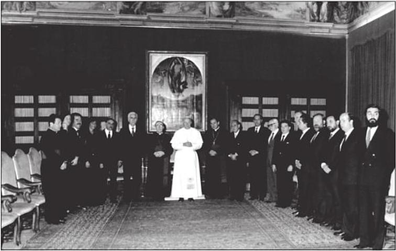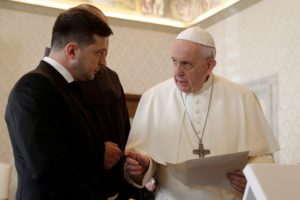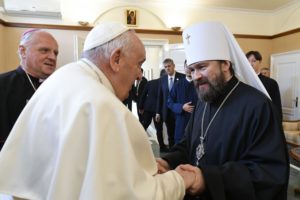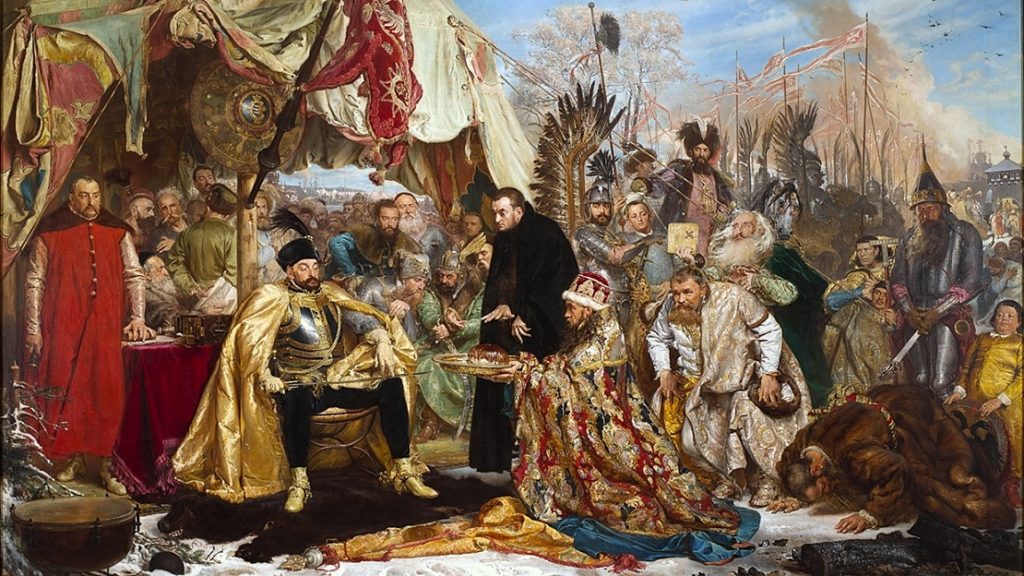ROME — Russia, led by a strongman with an unsavory reputation, invades a central European state, seeking to reassert control over lands it’s long considered part of its sphere of influence. Despite expectations of rapid success, Russian forces become bogged down facing stiff local resistance and a strong international coalition, suggesting a longer and bloodier war.
In that context, the pope steps forward and launches a secret peace mission, hoping to succeed where secular mediators and diplomats have failed.
That, of course, could be a nutshell version of the weekend’s big Catholic news flash, which was a cryptic suggestion by Pope Francis that a previously undisclosed Vatican mission is underway regarding the war in Ukraine.
In fact, however, those paragraphs refer to the 16th century, when Russia under Ivan the Terrible invaded what was then known as “Livonia,” territory that includes present-day Latvia and Estonia, triggering a bloody conflict with Poland and Sweden.
Combat waxed and waned for 25 years until Pope Gregory VIII, through Jesuit Father Antonio Possevino, a skilled trouble-shooter acting on behalf of the Vatican, negotiated a peace treaty on Jan. 15, 1582, effectively ending the war. In gratitude, the Polish king gave the Jesuits territory in Livonia confiscated from Protestants, helping to cement Catholicism’s presence in the Baltic regions.
For all those who scoff at the idea that the pope might be able to broker an end to a Russian invasion of central Europe, therefore, it’s important to stipulate that it’s actually happened before — and, for historical bonus points, with a Jesuit connection.
Indeed, no office in world history arguably has a longer or more distinguished track record in ending war than the papacy.
In the fifth century, Pope Leo the Great persuaded Attila the Hun to spare Rome from devastation; in the 13th century, Pope Boniface VIII brought the 100 Years' War to a peaceful end; in the 15th century, Pope Martin V mediated between France and England and restored peace to Europe; in the 19th century, Pope Leo XIII avoided a conflict between Germany and Spain over the Caroline Islands; and in the 20th century, St. Pope John Paul II pulled off a similar feat by preventing a war between Argentina and Chile over the Beagle Islands.

(On the subject of Pope Leo XIII, he also helped to avoid a conflict in the Philippines by settling the “friars question” in a manner favorable to the United States, among other things enjoining all Catholics in the country, including Spanish religious, to obedience to American colonial authorities in 1903.)
In other words, in principle, there’s nothing pie-in-the-sky about the idea of the pope and his Vatican emissaries conducting peace missions which, potentially, can prevent or end bloodshed. During the Middle Ages, there was even a concept known as the “Peace of God” (“Pax Dei”), through which popes curbed warfare through the use of ecclesiastical sanctions.
Granted, there is a case for skepticism about Francis’ enigmatic half-announcement, delivered Sunday during his return flight from a weekend trip to Hungary.
Here’s exactly what the pope said: “I’m willing, I’m willing to do everything that must be done. Also, now there’s a mission underway, but it’s not yet public, let’s see. … When it’s public, I’ll talk about it.”
The language was so vague, so devoid of detail, that some even wondered if Francis was simply floating a trial balloon, trying to gauge what reaction might be to a Vatican initiative rather than describing something that’s already on the table.
Skeptics have also noted that the 21st century is not the 16th, and the idea that a “secret” mission is even possible in the era of 24/7 news cycles and social media may strain credibility.
In addition, the principals to whom such a mission presumably would be directed have disavowed any knowledge of it. A Ukrainian official told CNN they’re in the dark.
“President Zelensky has not consented to any such discussions on Ukraine’s behalf,” the source was quoted as saying, adding, “If talks are happening, they are happening without our knowledge or our blessing.”

Likewise, the Russian news agency TASS quoted the press secretary of the President of the Russian Federation, Dmitry Peskov, who, when asked during a press briefing if he was aware of the Vatican’s peacemaking plans, said, “No, nothing is known.”
The first Vatican official to eventually confirm the mission isn’t even actually on the Vatican payroll anymore: Italian economist and layman Stefano Zamagni, who stepped down on March 31 as president of the Pontifical Academy of Social Sciences.
In an interview with the Italian newspaper Il Fatto Quotidiano, Zamagni said the pope has been working on something for around eight months, and the next few weeks will tell if it proceeds or hits a red light. Zamagni did not provide any details, other than saying that he’d prepared a seven-point peace plan back in September, and also adding that any solution has to involve both the U.S. and China.
A few days later, Vatican Secretary of State Cardinal Pietro Parolin also confirmed a “peacekeeping mission” was underway and claimed to be surprised by Russia and Ukraine’s denials.
It may not be entirely coincidental that three days after Francis hinted at a Vatican role as a mediator, Metropolitan Anthony of Volokolamsk, the No. 2 official in the Russian Orthodox Church, met in the Vatican with Archbishop Claudio Gugerotti, head of the Dicastery for Eastern Churches.

For the sake of completeness, however, it’s also important to note that for every papal peace mission that’s succeeded, there is probably a half-dozen that failed.
In October 1965, for instance, St. Pope Paul VI met U.S. President Lyndon Johnson in New York’s Waldorf Astoria Hotel to offer the Vatican’s services toward a negotiated end to the war in Vietnam. The war ground on for another eight years, and when it finally ended, the papacy was a non-factor.
To take another recent example, John Paul dispatched emissaries to both Baghdad and Washington in March 2003 in a last-ditch effort to avoid an American invasion. Despite those efforts, the war went ahead, with all the devastating consequences, which are now sadly familiar.
Still, for anyone interested in global diplomacy and geopolitics, what history suggests is a sort of “E.F. Hutton” lesson: When a pope talks about a peace mission, even a secret one, it’s a good idea for people to listen.
It may or may not work, but it almost always matters.

